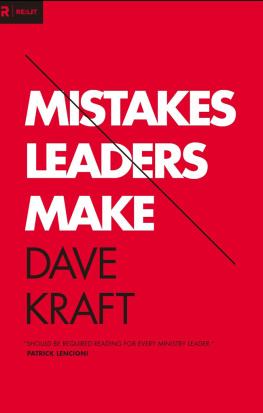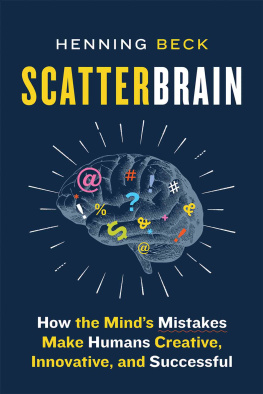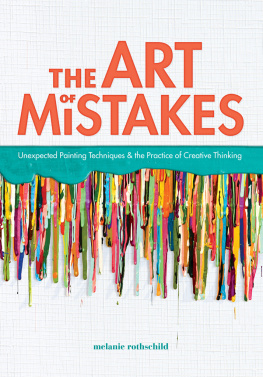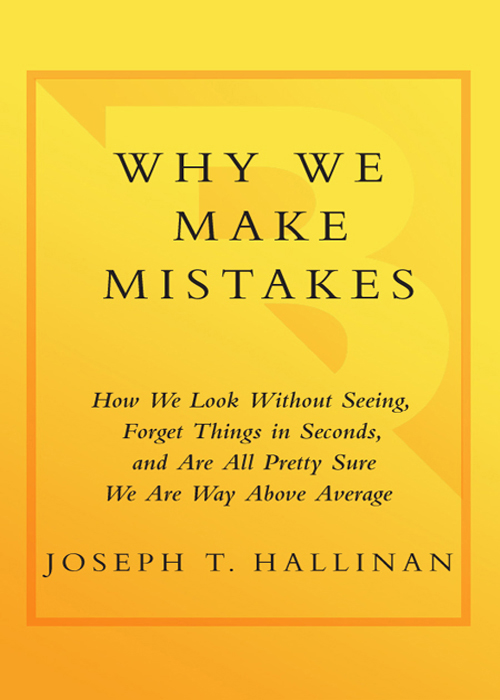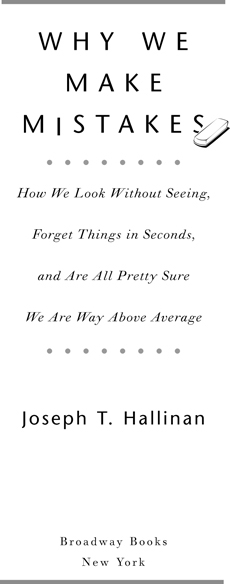Joseph T. Hallinan - Why We Make Mistakes: How We Look Without Seeing, Forget Things in Seconds, and Are All Pretty Sure We Are Way Above Average
Here you can read online Joseph T. Hallinan - Why We Make Mistakes: How We Look Without Seeing, Forget Things in Seconds, and Are All Pretty Sure We Are Way Above Average full text of the book (entire story) in english for free. Download pdf and epub, get meaning, cover and reviews about this ebook. year: 2009, publisher: Broadway Books, genre: History. Description of the work, (preface) as well as reviews are available. Best literature library LitArk.com created for fans of good reading and offers a wide selection of genres:
Romance novel
Science fiction
Adventure
Detective
Science
History
Home and family
Prose
Art
Politics
Computer
Non-fiction
Religion
Business
Children
Humor
Choose a favorite category and find really read worthwhile books. Enjoy immersion in the world of imagination, feel the emotions of the characters or learn something new for yourself, make an fascinating discovery.

- Book:Why We Make Mistakes: How We Look Without Seeing, Forget Things in Seconds, and Are All Pretty Sure We Are Way Above Average
- Author:
- Publisher:Broadway Books
- Genre:
- Year:2009
- Rating:3 / 5
- Favourites:Add to favourites
- Your mark:
Why We Make Mistakes: How We Look Without Seeing, Forget Things in Seconds, and Are All Pretty Sure We Are Way Above Average: summary, description and annotation
We offer to read an annotation, description, summary or preface (depends on what the author of the book "Why We Make Mistakes: How We Look Without Seeing, Forget Things in Seconds, and Are All Pretty Sure We Are Way Above Average" wrote himself). If you haven't found the necessary information about the book — write in the comments, we will try to find it.
We human beings have design flaws. Our eyes play tricks on us, our stories change in the retelling, and most of us are fairly sure were way above average. In Why We Make Mistakes, journalist Joseph T. Hallinan sets out to explore the captivating science of human errorhow we think, see, remember, and forget, and how this sets us up for wholly irresistible mistakes.
In his quest to understand our imperfections, Hallinan delves into psychology, neuroscience, and economics, with forays into aviation, consumer behavior, geography, football, stock picking, and more. He discovers that some of the same qualities that make us efficient also make us error prone. We learn to move rapidly through the world, quickly recognizing patternsbut overlooking details. Which is why thirteen-year-old boys discover errors that NASA scientists missand why you cant find the beer in your refrigerator.
Why We Make Mistakes is enlivened by real-life storiesof weathermen whose predictions are uncannily accurate and a witness who sent an innocent man to jailand offers valuable advice, such as how to remember where youve hidden something important. Youll learn why multitasking is a bad idea, why men make errors women dont, and why most people think San Diego is west of Reno (its not).
Why We Make Mistakes will open your eyes to the reasons behind your mistakesand have you vowing to do better the next time.
Joseph T. Hallinan: author's other books
Who wrote Why We Make Mistakes: How We Look Without Seeing, Forget Things in Seconds, and Are All Pretty Sure We Are Way Above Average? Find out the surname, the name of the author of the book and a list of all author's works by series.


